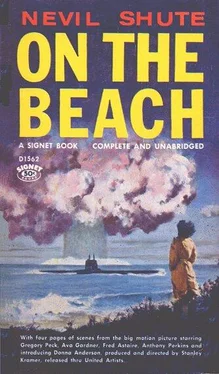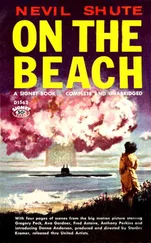He took the tram back to the Navy Department carrying the wheels tied together with a bit of rope. In the Second Naval Member’s offices he reported to the secretary, a paymaster lieutenant who was known to him. The young man said, "Good morning, sir. The admiral’s got your posting on his desk. He wants to see you personally. I’ll tell him that you’re here."
The lieutenant commander raised his eyebrows. It seemed unusual, but then in this reduced navy everything was apt to be a bit unusual. He put the wheels down by down by the paymaster’s desk, looked over his uniform with some concern, picked a hit of thread off the lapel of his jacket, and tucked his cap under his arm.
"The admiral will see you now, sir."
He marched into the office and came to attention. The admiral, seated at his desk, inclined his head, "Good morning, Lieutenant Commander. You can stand easy. Sit dawn."
Peter sat down in the chair beside the desk. The admiral leaned over and offered him a cigarette out of his case, and lit it for him with a lighter, "You’ve been unemployed for some time."
"Yes, sir."
The admiral lit a cigarette himself. "Well, I’ve got a sea-going appointment for you. I can’t give you a command, I’m afraid, and I can’t even put you in one of our own ships. I’m posting you as liaison officer in USS. Scorpion .
He glanced at the younger man. "I understand you’ve met Commander Towers."
"Yes, sir." He had met the captain of Scorpion two or three times in the last few months, a quiet, soft-spoken man of thirty-five or so with a slight New England accent. He had read the American’s report upon his ship’s war service. He had been at sea in his atomic-powered submarine on patrol between Kiska and Midway when the war began, and opening his sealed orders at the appropriate signal he submerged and set course for Manila at full cruising speed. On the fourth day, somewhere north of Iwo Jima, he came to periscope depth for an inspection of the empty sea as was his routine in each watch of the daylight hours and found the visibility to be extremely low, apparently with some sort of dust; at the same time the detector on his periscope bead indicated a high level of radioactivity. He attempted to report this to Pearl Harbor in a signal but got no reply; he carried on, the radioactivity increasing as he neared the Philippines. Next night he made contact with Dutch Harbor and passed a signal in code to his admiral, but was told that all communications were now irregular, and he got no reply. On the next night he failed to raise Dutch Harbor. He carried on upon his mission, setting course around the north of Luzon. In the Balintang Channel he found much dust and the radioactivity far above the lethal level, the wind being westerly, force 4 to 5. On the seventh day of the war he was in Manila Hay looking at the city through his periscope, still without orders. The atmospheric radioactivity was rather less here though still above the danger level; he did not care to surface or go up on to the bridge. Visibility was moderate; through the periscope he saw a pall of smoke drifting up above the city and formed the opinion that at least one nuclear explosion had taken place there within the last few days. He saw no activity on shore from five miles out in the bay. Proceeding to close the land he grounded his ship unexpectedly at periscope depth, being then in the main channel where the chart showed twelve fathoms; this reinforced his previous opinion. He blew his tanks and got off without difficulty, turned round, and went out to the open sea again.
That night he failed again to raise any American station, or any ship that could relay his signals. Blowing his tanks had used up much of his compressed air, and he did not care to take in the contaminated air in that vicinity. He had been submerged by that time for eight days; his crew were still fairly fit though various neuroses were beginning to appear, born of anxiety about conditions in their homes. He established radio contact with an Australian station at Port Moresby in New Guinea; conditions there appeared to be normal, but they could not relay any of his signals.
It seemed to him that the best thing he could do would be to go south. He went back round the north of Luzon and set course for Yap Island, a cable station under the control, of the United States. He got there three days later. Here the radioactive level was so low as to be practically normal; he surfaced in a moderate sea, blew out the ship with clean air, charged his tanks, and let the crew up on the bridge in batches. On entering the roads he was relieved to find an American cruiser there. She directed him to an anchorage and sent a boat; he moored ship, let the whole crew up on deck, and went off in the boat to put himself under the command of the captain, of the cruiser, a Captain Shaw. Here he learned for the first time of the Russian-Chinese war that had flared up out of the Russian-NATO war, that had in turn been born of the Israeli-Arab war, initiated by Albania. He learned of the use of cobalt bombs by both the Russians and the Chinese; that news came deviously from Australia, relayed from Kenya. The cruiser was waiting at Yap to rendezvous with a Fleet tanker; she had been there for a week and in the last five days she had been out of communication with the United States. The captain had sufficient bunker fuel to get his ship to Brisbane at her most economical speed, but no further.
Commander Towers stayed at Yap for six days while the news, such as it was, grew steadily worse. They did not succeed in making contact with any station in the United States or Europe, but for the first two days or so they were able to pick up news broadcasts from Mexico City, and that news was just about as bad as it could be. Then that station went off the air, and they could only get Panama, Bogota, and Valparaiso, who knew practically nothing about what was going on up in the northern continent. They made contact with a few ships of the U.S. Navy in the South Pacific, most of them as short of fuel as they were themselves. The captain of the cruiser at Yap proved to be the senior officer of all these ships; he made the decision to sail all U.S. ships into Australian waters and to place his forces under Australian command. He made signals to all ships to rendezvous with him at Brisbane. They congregated there a fortnight later, eleven ships of the U.S. Navy, all out of bunker fuel and with very little hope of getting any more. That was a year ago; they were there still.
The nuclear fuel required for U.S.S. Scorpion was not available in Australia at the time of her arrival, but it could be prepared. She proved to be the only naval vessel in Australian waters with any worth-while radius of action so she was sailed to Williamstown, the naval dockyard of Melbourne, being the nearest port to the headquarters of the Navy Department. She was, in fact, the only warship in Australia worth bothering about. She stayed idle for some time while her nuclear fuel was prepared till, six months previously, she had been restored to operational mobility. She then made a cruise to Rio de Janeiro, carrying supplies of fuel for another American nuclear submarine that had taken refuge there, and returned to Melbourne to undergo a fairly extensive refit in the dockyard.
All this was known to Peter Holmes as the background of Commander Towers, U.S.N., and it passed quickly through his mind as he sat before the admiral’s desk. The appointment that he had been offered was a new one; there had been no Australian liaison officer in Scorpion when she had made her South American cruise. The thought of Mary and his little daughter troubled him now and prompted him to ask, "How long is this appointment for, sir?"
The admiral shrugged his shoulders slightly. "We could say a year. I imagine it will be your last posting, Holmes."
Читать дальше












